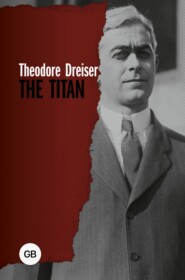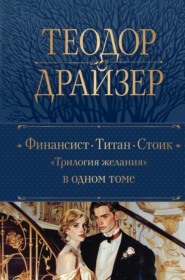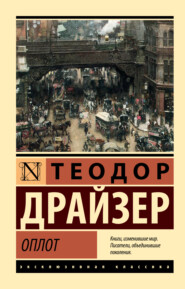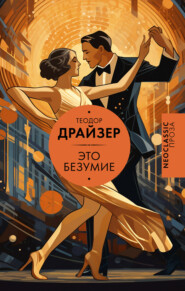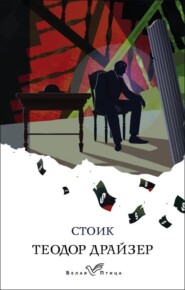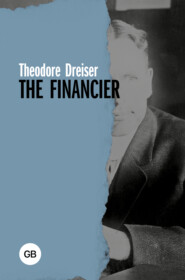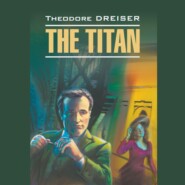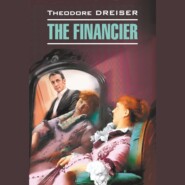По всем вопросам обращайтесь на: info@litportal.ru
(©) 2003-2025.
✖
The "Genius"
Настройки чтения
Размер шрифта
Высота строк
Поля
"He's right," said Eugene. "I agree as to the dress, and it fits the hair wonderfully."
"You see, he's lost, too," laughed Bangs. "That's the way they all do. Well, I'm going to leave you two. I've got to get back. I left your sister in the hands of a rival of mine."
Eugene turned to this girl and laughed his reserved laugh. "I was just thinking what was going to become of me. I've been away for two years, and I've lost track of some of these people."
"I'm worse yet. I've only been here two weeks and I scarcely know anybody. Mrs. King takes me around everywhere, but it's all so new I can't get hold of it. I think Alexandria is lovely."
"It is nice. I suppose you've been out on the lakes?"
"Oh, yes. We've fished and rowed and camped. I have had a lovely time but I have to go back tomorrow."
"Do you?" said Eugene. "Why I do too. I'm going to take the four-fifteen."
"So am I!" she laughed. "Perhaps we can go together."
"Why, certainly. That's fine. I thought I'd have to go back alone. I only came down for over Sunday. I've been working up in Chicago."
They fell to telling each other their histories. She was from Blackwood, only eighty-five miles from Chicago, and had lived there all her life. There were several brothers and sisters. Her father was evidently a farmer and politician and what not, and Eugene gleaned from stray remarks that they must be well thought of, though poor. One brother-in-law was spoken of as a banker; another as the owner of a grain elevator; she herself was a school teacher at Blackwood – had been for several years.
Eugene did not realize it, but she was fully five years older than himself, with the tact and the superior advantage which so much difference in years brings. She was tired of school-teaching, tired of caring for the babies of married sisters, tired of being left to work and stay at home when the ideal marrying age was rapidly passing. She was interested in able people, and silly village boys did not appeal to her. There was one who was begging her to marry him at this moment, but he was a slow soul up in Blackwood, not actually worthy of her nor able to support her well. She was hopefully, sadly, vaguely, madly longing for something better, and as yet nothing had ever turned up. This meeting with Eugene was not anything which promised a way out to her. She was not seeking so urgently – nor did she give introductions that sort of a twist in her consciousness. But this young man had an appeal for her beyond anyone she had met recently. They were in sympathetic accord, apparently. She liked his clear, big eyes, his dark hair, his rather waxen complexion. He seemed something better than she had known, and she hoped that he would be nice to her.
CHAPTER VIII
The rest of that evening Eugene spent not exactly with, but near Miss Blue – Miss Angela Blue, as he found her name to be. He was interested in her not so much from the point of view of looks, though she was charming enough, but because of some peculiarity of temperament which lingered with him as a grateful taste might dwell on the palate. He thought her young; and was charmed by what he considered her innocence and unsophistication. As a matter of fact she was not so much young and unsophisticated as an unconscious simulator of simplicity. In the conventional sense she was a thoroughly good girl, loyal, financially honest, truthful in all commonplace things, and thoroughly virtuous, moreover, in that she considered marriage and children the fate and duty of all women. Having had so much trouble with other peoples' children she was not anxious to have any, or at least many, of her own. Of course, she did not believe that she would escape with what seemed to be any such good fortune. She fancied that she would be like her sisters, the wife of a good business or professional man; the mother of three or four or five healthy children; the keeper of an ideal middle class home; the handmaiden of her husband's needs. There was a deep current of passion in her which she had come to feel would never be satisfied. No man would ever understand, no man at least whom she was likely to meet; but she knew she had a great capacity to love. If someone would only come along and arouse that – be worthy of it – what a whirlwind of affection she would return to him! How she would love, how sacrifice! But it seemed now that her dreams were destined never to be fulfilled, because so much time had slipped by and she had not been courted by the right one. So here she was now at twenty-five, dreaming and longing – the object of her ideals thus accidentally brought before her, and no immediate consciousness that that was the case.
It does not take sexual affinity long to manifest itself, once its subjects are brought near to each other. Eugene was older in certain forms of knowledge, broader in a sense, potentially greater than she would ever comprehend; but nevertheless, swayed helplessly by emotion and desire. Her own emotions, though perhaps stronger than his, were differently aroused. The stars, the night, a lovely scene, any exquisite attribute of nature could fascinate him to the point of melancholy. With her, nature in its largest aspects passed practically unnoticed. She responded to music feelingly, as did Eugene. In literature, only realism appealed to him; for her, sentiment, strained though not necessarily unreal, had the greatest charm. Art in its purely æsthetic forms meant nothing at all to her. To Eugene it was the last word in the matter of emotional perception. History, philosophy, logic, psychology, were sealed books to her. To Eugene they were already open doors, or, better yet, flowery paths of joy, down which he was wandering. Yet in spite of these things they were being attracted toward each other.
And there were other differences. With Eugene convention meant nothing at all, and his sense of evil and good was something which the ordinary person would not have comprehended. He was prone to like all sorts and conditions of human beings – the intellectual, the ignorant, the clean, the dirty, the gay, the sorrowful, white, yellow, black. As for Angela, she had a distinct preference for those who conducted themselves according to given standards of propriety. She was brought up to think of those people as best who worked the hardest, denied themselves the most, and conformed to the ordinary notions of right and wrong. There was no questioning of current standards in her mind. As it was written socially and ethically upon the tables of the law, so was it. There might be charming characters outside the pale, but they were not admitted to association or sympathy. To Eugene a human being was a human being. The ruck of misfits or ne'er-do-wells he could laugh joyously with or at. It was all wonderful, beautiful, amusing. Even its grimness and tragedy were worth while, although they hurt him terribly at times. Why, under these circumstances, he should have been so thoroughly attracted to Angela remains a mystery. Perhaps they complemented each other at this time as a satellite complements a larger luminary – for Eugene's egoism required praise, sympathy, feminine coddling; and Angela caught fire from the warmth and geniality of his temperament.
On the train next day Eugene had nearly three hours of what he deemed most delightful talk with her. They had not journeyed far before he had told her how he had traveled this way, on this train, at this hour, two years before; how he had walked about the streets of the big city, looking for a place to sleep, how he had got work and stayed away until he felt that he had found himself. Now he was going to study art and then to New York or Paris, and do magazine illustrating and possibly paint pictures. He was truly your flamboyant youth of talent when he got to talking – when he had a truly sympathetic ear. He loved to boast to someone who really admired him, and he felt that he had admiration here. Angela looked at him with swimming eyes. He was really different from anything she had ever known, young, artistic, imaginative, ambitious. He was going out into a world which she had longed for but never hoped to see – that of art. Here he was telling her of his prospective art studies, and talking of Paris. What a wonderful thing!
As the train neared Chicago she explained that she would have to make an almost immediate connection with one which left over the Chicago Milwaukee and St. Paul, for Blackwood. She was a little lonely, to tell the truth, a little sick at heart, for the summer vacation was over and she was going back to teach school. Alexandria, for the two weeks she had been there visiting Mrs. King (formerly a Blackwood girl and school-day chum of hers), was lovely. Her girlhood friend had tried to make things most pleasant and now it was all over. Even Eugene was over, for he said nothing much of seeing her again, or had not so far. She was wishing she might see more of this world he painted in such glowing colors, when he said:
"Mr. Bangs said that you come down to Chicago every now and then?"
"I do," she replied. "I sometimes come down to go to the theatres and shop." She did not say that there was an element of practical household commercialism in it, for she was considered one of the best buyers in the family and that she was sent to buy by various members of the family in quantities. From a practical household point of view she was a thoroughbred and was valued by her sisters and friends as someone who loved to do things. She might have come to be merely a family pack horse, solely because she loved to work. It was instinct to do everything she did thoroughly, but she worked almost exclusively in minor household matters.
"How soon do you expect to come down again?" he asked.
"Oh, I can't tell. I sometimes come down when Opera is on in the winter. I may be here around Thanksgiving."
"Not before that?"
"I don't think so," she replied archly.
"That's too bad. I thought maybe I'd see you a few times this fall. When you do come I wish you could let me know. I'd like to take you to the theatre."
Eugene spent precious little money on any entertainment, but he thought he could venture this. She would not be down often. Then, too, he had the notion that he might get a rise one of these days – that would make a difference. When she came again he would be in art school, opening up another field for himself. Life looked hopeful.
"That's so nice of you," she replied. "And when I come I'll let you know. I'm just a country girl," she added, with a toss of her head, "and I don't get to the city often."
Eugene liked what he considered the guileless naïveté of her confessions – the frankness with which she owned up to simplicity and poverty. Most girls didn't. She almost made a virtue out of these thing – at least they were charming as a confession in her.
"I'll hold you to that," he assured her.
"Oh, you needn't. I'll be glad to let you know."
They were nearing the station. He forgot, for the moment that she was not as remote and delicate in her beauty as Stella, that she was apparently not as passionate temperamentally as Margaret. He saw her wonderfully dull hair and her thin lips and peculiar blue eyes, and admired her honesty and simplicity. He picked up her grip and helped her to find her train. When they came to part he pressed her hand warmly, for she had been very nice to him, so attentive and sympathetic and interested.
"Now remember!" he said gaily, after he had put her in her seat in the local.
"I won't forget."
"You wouldn't mind if I wrote you now and then?"
"Not at all. I'd like it."
"Then I will," he said, and went out.
He stood outside and looked at her through the train window as it pulled out. He was glad to have met her. This was the right sort of girl, clean, honest, simple, attractive. That was the way the best women were – good and pure – not wild pieces of fire like Margaret; nor unconscious, indifferent beauties like Stella, he was going to add, but couldn't. There was a voice within him that said that artistically Stella was perfect and even now it hurt him a little to remember. But Stella was gone forever, there was no doubt about that.
During the days that followed he thought of the girl often. He wondered what sort of a town Blackwood was; what sort of people she moved with, what sort of a house she lived in. They must be nice, simple people like his own in Alexandria. These types of city bred people whom he saw – girls particularly – and those born to wealth, had no appeal for him as yet. They were too distant, too far removed from anything he could aspire to. A good woman such as Miss Blue obviously was, must be a treasure anywhere in the world. He kept thinking he would write to her – he had no other girl acquaintance now; and just before he entered art school he did this, penning a little note saying that he remembered so pleasantly their ride; and when was she coming? Her answer, after a week, was that she expected to be in the city about the middle or the end of October and that she would be glad to have him call. She gave him the number of an aunt who lived out on the North Side in Ohio Street, and said she would notify him further. She was hard at work teaching school now, and didn't even have time to think of the lovely summer she had had.
"Poor little girl," he thought. She deserved a better fate. "When she comes I'll surely look her up," he thought, and there was a lot that went with the idea. Such wonderful hair!
CHAPTER IX
The succeeding days in the art school after his first admission revealed many new things to Eugene. He understood now, or thought he did, why artists were different from the rank and file of mankind. This Art Institute atmosphere was something so refreshing after his days rambling among poor neighborhoods collecting, that he could hardly believe that he, Eugene Witla, belonged there. These were exceptional young people; some of them, anyhow. If they weren't cut out to be good artists they still had imagination – the dream of the artist. They came, as Eugene gradually learned, from all parts of the West and South, from Chicago and St. Louis – from Kansas, Nebraska and Iowa – from Texas and California and Minnesota. One boy was in from Saskatchewan of the Canadian north west, another from the then territory of New Mexico. Because his name was Gill they called him the Gila monster – the difference in the pronunciation of the "G's" not troubling them at all. A boy who came down from Minnesota was a farmer's son, and talked about going back to plow and sow and reap during the next spring and summer. Another boy was the son of a Kansas City millionaire.
The mechanics of drawing interested Eugene from the first. He learned the first night that there was some defect in his understanding of light and shade as it related to the human form. He could not get any roundness or texture in his drawings.
"The darkest shadow is always closest to the high light," observed his instructor laconically on Wednesday evening, looking over his shoulder. "You're making everything a dull, even tone." So that was it.
"You're drawing this figure as a bricklayer who isn't an architect might start to build a house. You're laying bricks without having a plan. Where's your plan?" The voice was that of Mr. Boyle looking over his shoulder.
Eugene looked up. He had begun to draw the head only.
"A plan! A plan!" said his instructor, making a peculiar motion with his hands which described the outline of the pose in a single motion. "Get your general lines first. Then you can put in the details afterward."
Eugene saw at once.
Another time his instructor was watching him draw the female breast. He was doing it woodenly – without much beauty of contour.
"They're round! They're round! I tell you!" exclaimed Boyle. "If you ever see any square ones let me know."
This caught Eugene's sense of humor. It made him laugh, even though he flushed painfully, for he knew he had a lot to learn.
The cruelest thing he heard this man say was to a boy who was rather thick and fat but conscientious. "You can't draw," he said roughly. "Take my advice and go home. You'll make more money driving a wagon."






